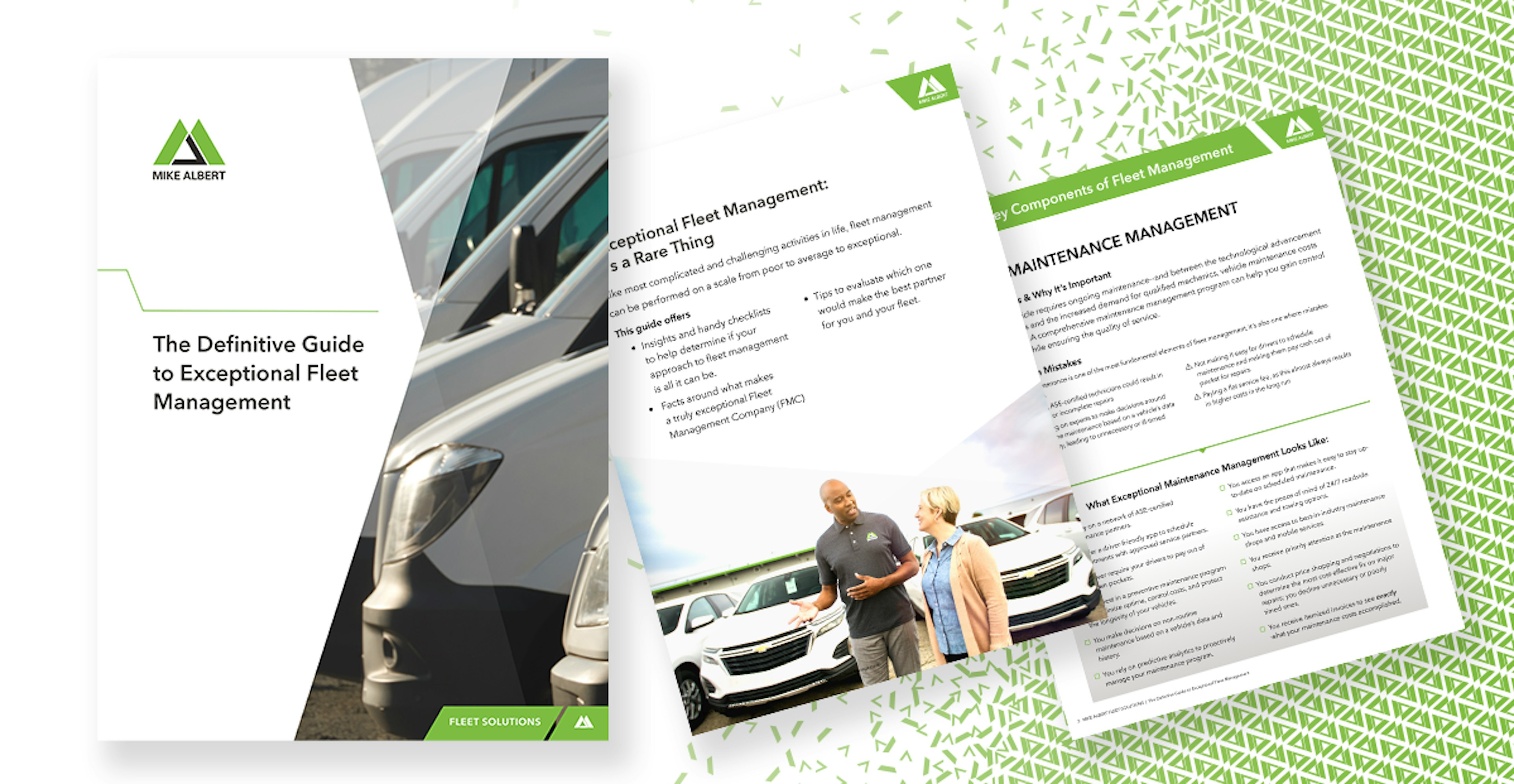FLEET ELECTRIFICATION
The advantages of electric vehicles (EVs) for fleets are real, as proven by Amazon, Anheuser-Busch, and thousands of other organizations and municipalities across the nation. The question is how can EVs be a viable and beneficial option for your fleet? And when should you start the transition and how aggressively? Several factors unique to your organization should be considered before arriving at the best answers.
We've collected the most frequently asked questions of fleet electrification. Reveal the answers by expanding the text under the question.
Due to falling battery costs and other advancements, several EV models are closing the price gap with comparable ICE models. In fact, many traditional auto manufacturers are bringing dozens of EVs to market by 2025 with near cost parity to ICE vehicles (when incentive savings are leveraged.) As a privately-owned lessor, we can help you secure and monetize any [incentives, grants, and tax credits](https://www.mikealbert.com/fleet-studies-lab/electric-hybrid-alt-fuel/electric-fleet-vehicles) available for EVs in your area.
Several EVs coming to market—including light-duty work trucks and vans—are generally in the same price range as many new ICE vehicle equivalents when you factor in the EV incentives. Additionally, the [TCO of EVs is significantly less than that of ICE vehicles](https://www.mikealbert.com/fleet-studies-lab/electric-hybrid-alt-fuel/reduce-your-carbon-footprint) due to a 40-60% average maintenance expense reduction and the lower average cost of charging compared to fueling.
Over the years, the technological evolution of EV batteries has made them significantly more powerful and [capable of single charge ranges in hundreds of miles](https://www.mikealbert.com/fleet-studies-lab/electric-hybrid-alt-fuel/implementing-evs-into-a-fleet-management-strategy). However, for fleets, several factors impact an EV’s battery range, including daily routes, miles driven per shift or day, and payloads. It’s critical to evaluate these factors to determine if EVs are right for your fleet, and if so, which models. It’s also essential to plan for public and private charging when your EVs are not in use—overnight, during breaks, or when drivers are working on-site to help extend battery range.
Yes, they can. Most electric trucks have the same gross vehicle weight rating as ICE vehicle equivalents. However, if an electric truck is towing and/or carrying a heavy payload, especially on long routes or across country, you’ll need to account for a shorter battery charge range. The main factors that reduce battery range are highway and interstate driving, traveling up hills and steep grades, and [extremely cold weather](https://www.mikealbert.com/fleet-studies-lab/electric-hybrid-alt-fuel/how-to-prepare-electric-vehicles-for-winter-months).
To electrify your fleet successfully, [it’s necessary to establish an internal charging infrastructure in addition to using public charging when needed](https://www.mikealbert.com/fleet-studies-lab/electric-hybrid-alt-fuel/are-there-enough-ev-charging-stations-to-power-your-fleet). But before committing to EVs, you need to first assess the daily duty cycle of your current ICE vehicles—including miles driven, payload, idle time, and stops—and determine if EVs can perform as well or better when enduring the same level of use.
We’ve partnered with the top EV supply equipment vendors in the industry to offer you the best charging options for your fleet. With our partners’ assistance, you can install and utilize charging stations at your fleet vehicle depot(s) or your drivers’ homes and choose a payment system that works best for your organization.
Several manufacturers—both long-standing and new—have been developing electric work vehicle models for the last couple years. Traditional OEMs like Ford and GM are bringing trucks and vans to market now. And new OEMs like Rivian, GM, Ford, Mercedes, Brightdrop, Xos, and Canoo are also introducing [light-duty and last-mile electric trucks and vans](https://www.mikealbert.com/fleet-studies-lab/electric-hybrid-alt-fuel/a-guide-to-electric-trucks-and-vans-coming-to-market-soon) to the market.
We leverage our relationships with EV manufacturers nationwide to source any EV models you want and ship them directly to you.
Upon request, we can provide your drivers with the training they need to take advantage of the full potential EVs provide in terms of [safety, efficiency, and comfort](https://www.mikealbert.com/fleet-studies-lab/electric-hybrid-alt-fuel/implementing-evs-into-a-fleet-management-strategy).
We can set you up with a telematics system that is specific to your EVs. Plus, many OEMs are providing fleet customers with access to their EV data, such as [battery efficiency, energy depletion, charging kWh, and real-time state of charge](https://www.mikealbert.com/fleet-studies-lab/electric-hybrid-alt-fuel/ev-faqs-your-questions-about-electric-fleets-answered). And soon, over-the-air updates will be available via connected vehicle technology.
Complimentary Access: Definitive Guide to Fleet Management
Examine the critical components that go into fleet management, what mistakes to avoid, and checklists for exeptional fleet management.
